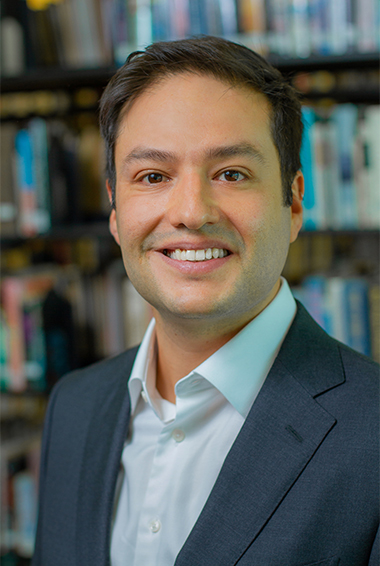Archival Research of Rare Text Published, With a Prize
 Medieval literature scholar Bernardo Hinojosa (English) first encountered works from the Middle Ages as an undergraduate at Columbia University. “It completely changed my life,” says Hinojosa. He latched on to the experimentation and innovation of the period: “The beginnings of a literary tradition were being built for the first time,” he says.
Medieval literature scholar Bernardo Hinojosa (English) first encountered works from the Middle Ages as an undergraduate at Columbia University. “It completely changed my life,” says Hinojosa. He latched on to the experimentation and innovation of the period: “The beginnings of a literary tradition were being built for the first time,” he says.
Now in his second semester as a professor at St. Norbert College, Hinojosa’s essay “The Shapes of the Speculum Christiani: Scribal Technique and Literary Aesthetics in 15th-Century England” has been published in the journal New Medieval Literatures 23 and Hinojosa was awarded the New Medieval Literatures Scholars of Colour Essay Prize.
A fresh set of eyes
The publication is the culmination of eight years of work tracking down manuscripts across England and developing an intimate understanding of a text with only 60 known copies in existence.
“The only extended engagement with this text is from the Ph.D. thesis of now a professor emeritus at Oxford [Vincent Gillespie, a notable academic in the field of medieval literary studies]. So, it’s a text that is tremendously understudied,” says Hinojosa. “It required years of archival research to be able to see all these manuscripts of a religious manual that was written and then copied in the 15th century. I looked at every single manuscript of this text … the way in which the scribes copied this devotional manual showed their attention, not just to the content of the work, but also to the formal features of the work to the style and literary devices used in the work.”
Most of the works were viewed in person at the British Library, the Bodleian Library in Oxford and the Cambridge University Library, while Hinojosa was a graduate student at Cambridge.
The New Medieval Scholar’s Prize recognizes the achievements of scholars who are working toward more diversity and inclusion in the field. “I am one of, I believe, three tenure-track Latinx professors of medieval literature in the country, which is something that’s always in my mind whenever I’m in the classroom or whenever I’m at a conference or sending my research around,” Hinojosa says. “And so I’m very thankful for this support that I received from this prize.”
NYC to Cambridge, Berkeley to De Pere
As a student, researcher and teacher, Hinojosa has experienced a wide variety of academic institutions: an Ivy League in New York City Columbia, the hallowed halls of Cambridge and a powerhouse public university in University of California, Berkeley. Now at a small, liberal arts college in De Pere, he’s enjoying the teaching-focused nature around St. Norbert’s campus, yet he’s impressed with the college’s support of his research. “We have an extraordinary library willing to support faculty and their research, in whatever way possible. I have found that it’s an institution that cares about the research of its faculty. … The college recognizes that good teaching comes out of the position that we occupy as teacher-scholars: work, research and teaching at the same time.”
Hinojosa is teaching two introductory literature courses that have students reading a variety of works from around the world written before 1500 that represent the natural world in some capacity. He’s also teaching a medieval dream poetry course, discussing texts written primarily in England that take place within the mind of someone who is sleeping.
This period of literature challenges students in interesting ways, Hinojosa says. “When I teach the original Middle English as was written and spoken 600 years ago, the words on the page are strange and alien to the students. The students don’t have the frame of reference to understand a lot of the solutions and citations, and it’s that encounter with strangeness that I think gets students’ creative juices flowing, as they seek to build up the necessary knowledge to understand what’s on the page. I think that especially the teaching of medieval literature, it’s not just about understanding the origins of literary expression in English, but it’s also teaching what to do when you’re faced with something you don’t immediately understand.”
Note: A previous version of this article mentioned that the journal New Medieval Literatures is published by the Oxford University Press. The journal has a strong connection with the English faculty at Oxford University, but is published by Boydell & Brewer.
April 18, 2023











